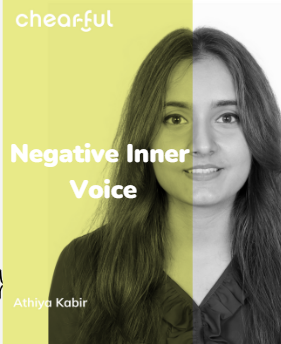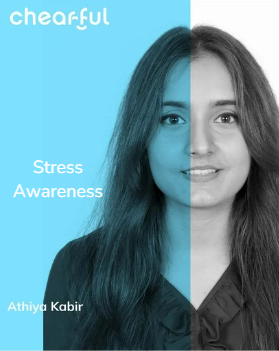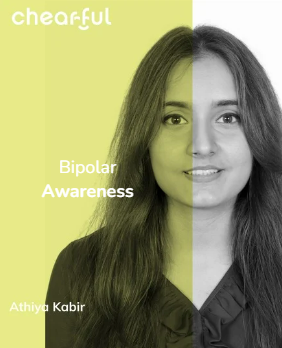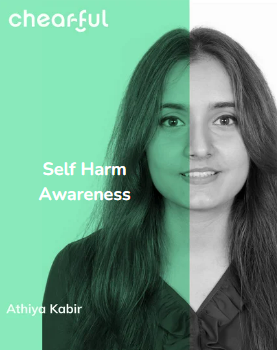
Chearful soundbites we think you’ll enjoy
Popular Topics

Therapy Misconceptions
Dismantling Myths: Exploring the Realities of Therapy. In this video, we tackle common misconceptions surrounding mental health treatment, offering clarity and insight into the transformative journey of therapy. Let's challenge assumptions and embrace a more informed perspective!


Why is therapy important
Is your body sending you messages? Listen to what it's telling you about your mental health.


Negative Inner Voice
Ever find that negative voice in your head a bit too loud? Check out this video for easy tips on turning down the negativity

Learning to Forgive
Forgiving betrayal can be difficult and painful, but it is possible with time and effort. Here are some steps you can take, to begin the process: Acknowledge your feelings: Betrayal can be a deeply hurtful experience, and it's important to allow yourself to feel the range of emotions that come with it, such as: anger, sadness, and disappointment. Don't try to suppress or deny your feelings, but rather identify, and allow yourself to understand them. Practice empathy: Try to put yourself in the other person's shoes and understand why they may have acted in the way they did. This doesn't mean that you excuse their behavior, but it can help you to see things from their perspective. Communicate your needs: If you feel ready to confront the person who betrayed you, it can be helpful to talk about your needs and boundaries clearly. Let them know how their actions affected you and what you need from them to move forward. Let go of grudges: Holding onto anger and resentment can become toxic and hurtful. Instead, try to focus on your own healing and growth. Practice self-care: It's important to prioritize your own well-being during this time. Practice self-care activities that help you to feel grounded and centered, such as exercise, meditation, or spending time with loved ones. Remember that forgiveness is a personal process, and there is no right or wrong way to go about it. Give yourself time and space to heal, and don't be afraid to seek support from friends, family, or a therapist . The Chearful team thanks you for watching, we are here to help and support you.

Your Family and Phone Addiction
Cell Phone addiction can have negative consequences on a person’s physical and mental health, as well as their social relationships and overall well-being. Managing your family's phone addiction may be challenging, but here are some strategies that can help: Establish clear rules and guidelines around phone use for everyone in the family. For example, you may decide to have a "no phones during meals" rule or limit phone use after a certain time at night. Be sure to communicate these rules clearly and consistently enforce them. Encourage family members to engage in other activities that they enjoy, such as playing games, reading, or spending time outdoors. This can help reduce the need for constant phone use and provide other sources of pleasure and fulfillment. Be a good role model for your family by modeling healthy phone use habits yourself. Limit your own phone use and prioritize spending quality time with your family. Make a conscious effort to spend quality time together as a family doing activities that everyone enjoys. This can help strengthen your family bonds and reduce the need for constant phone use. There are many apps available that can help limit phone use, such as apps that block certain websites or apps during specific times of day or limit overall screen time. Encourage open and honest communication with your family about their phone use. Let them know how their phone use is affecting the family dynamic, and encourage them to be open to making changes. Remember, managing phone addiction in the family takes time and effort, but with patience, communication, and support, it is possible to make positive changes. It is a team effort.

Managing Your Anger with Healthy Practices
Managing anger can be a challenging task, but with practice and the right tools, it can become easier over time. Here are some strategies that can help Identify triggers: Keeping a journal or taking note of what situations or people make you angry can help you identify patterns and come up with strategies to manage those triggers. Practice relaxation techniques: Techniques like deep breathing, meditation, or yoga can help you calm down when you feel angry. Make a habit of practicing these techniques regularly, so they become a natural response to anger. Communicate effectively: Learning how to express your anger in a constructive way is important. Try to use "I" statements instead of "you" statements, avoid blaming or attacking language, and stick to the topic at hand. Take a break: Sometimes, it's best to step away from a situation that's making you angry. Take a few minutes to calm down and collect your thoughts before returning to the situation. And of course, Get support: If you're struggling to manage your anger, consider seeking help from a therapist or support group. They can help you develop coping skills and offer guidance. Most importantly, don't forget to be patient with yourself as you navigate through your emotions. Thank you for watching, and the Chearful team wishes you well!

What is empathy - 3 tips to cultivate it
Hi, I'm Priya Cima and I'd like to talk to you about empathy. What is empathy? Empathy is literally showing understanding and compassion to other people. It's about knowing and understanding what they feel and how they feel. And empathy can be learned, and it needs to be practiced. So how do we practice empathy? Three very simple ways that we can practice empathy. One, be curious, ask questions, ask people how they feel. There is no awkward moment when all you're doing is showing that you care. Two, join a larger cause, something that's bigger than yourself, and something that has meaning for you so you can learn about different things, and different people, different cultures, different ways of living and feeling. And three finally, listen. Listen carefully to the underlying emotions, feelings, thoughts that come behind words that people use, give them time to speak, respond and don't react.

Post-traumatic Growth
Hi, I'm Dr. Chris Willard. I'm a clinical psychologist, faculty at Harvard Medical School and an author of a number of different books. The one I'm most excited about, and the concept I'm most excited about comes out of positive psychology. And it's this idea of post traumatic growth. What we actually know? Well, we certainly know that many of us have been through incredibly trying challenging experiences in these past few years during the pandemic. And even before and after the pandemic, so many other traumas of life, big and small, whatever even that means have been experienced by us and the people that we love and other people around the world. What's amazing now is that actually, more people go on to experience post traumatic growth, in addition to post traumatic stress in their lives after going through difficult times. I'm really excited. I'm doing a series of workshops on this topic, have a new book coming out on this topic, how we grow through what we go through which I think we've all been through some hard times, and thinking about what are the practices that we know from spirituality? What are the practices that we know from anthropology, even from history, as well as from neuroscience and contemporary psychology, and positive psychology that can teach us how we can thrive not just survive in this space of life's challenges? So I hope that you'll research this topic, learn a little bit more about it. I know through Chearful there'll be a lot of resources on this topic of post traumatic growth, as well as topics like self compassion, as well as topics like positive psychology as well as topics like mindfulness and others that are near and dear to my heart. And I hope that you'll check them out and I look forward to getting to know you better.

What does good mental health mean
Hi everyone. I'm Priya Cima. Welcome to cheerful.com. I'm here to talk to you a little bit about mental health and the terminology or the phrase good mental health. In today's world, international health organizations across the globe have decided and have acknowledged the fact that people's mental health and well-being is so important, especially as we have stress and anxiety on the rise. It's important for us to understand what good mental health actually means. The term good mental health refers to the emotional, psychological, and social well-being of an individual, and how they actually manage the stresses in their life. So good mental health is really about the behavior that translates from the emotions and thoughts that they feel. So, what does that mean? Good mental health is about acknowledging and accepting the fact that a person person can feel fear, loss, pain, any of the negative emotions, so called negative emotions, as well as the positive emotions like happiness, joy, and peace. So, it's about really allowing a person to go through the spectrum of emotions, acknowledging them, accepting them, and then learning how to manage the behaviors that come out of them in an effective and healthy manner. And that is good mental health. Thank you.

Articles
Build your awareness and get inspired with our researched articles on how you can strengthen your well-being

Stress Management Techniques
 424
Reads
424
Reads






